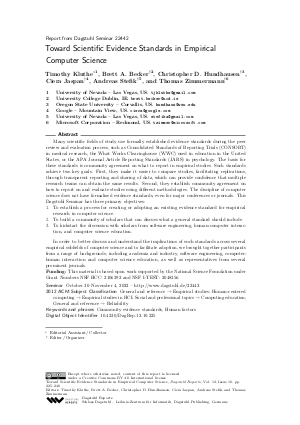Toward Scientific Evidence Standards in Empirical Computer Science (Dagstuhl Seminar 22442)
Authors Timothy Kluthe, Brett A. Becker, Christopher D. Hundhausen, Ciera Jaspan, Andreas Stefik, Thomas Zimmermann and all authors of the abstracts in this report
-
Part of:
Issue:
Dagstuhl Reports, Volume 12, Issue 10
Part of: Volume: Dagstuhl Reports, Volume 12
Part of: Journal: Dagstuhl Reports (DagRep) - License:
 Creative Commons Attribution 4.0 International license
Creative Commons Attribution 4.0 International license
- Publication Date: 2023-05-03
File

PDF
DagRep.12.10.225.pdf
- Filesize: 2.13 MB
- 16 pages
Document Identifiers
Subject Classification
ACM Subject Classification
- General and reference → Empirical studies
- Human-centered computing → Empirical studies in HCI
- Social and professional topics → Computing education
- General and reference → Reliability
Keywords
- Community evidence standards
- Human factors
Metrics
- Access Statistics
-
Total Accesses (updated on a weekly basis)
0Document
0Metadata
Abstract
Many scientific fields of study use formally established evidence standards during the peer review and evaluation process, such as Consolidated Standards of Reporting Trials (CONSORT) in medical research, the What Works Clearinghouse (WWC) used in education in the United States, or the APA Journal Article Reporting Standards (JARS) in psychology. The basis for these standards is community agreement on what to report in empirical studies. Such standards achieve two key goals. First, they make it easier to compare studies, facilitating replications, through transparent reporting and sharing of data, which can provide confidence that multiple research teams can obtain the same results. Second, they establish community agreement on how to report on and evaluate studies using different methodologies. The discipline of computer science does not have formalized evidence standards, even for major conferences or journals. This Dagstuhl Seminar has three primary objectives: 1) To establish a process for creating or adopting an existing evidence standard for empirical research in computer science. 2) To build a community of scholars that can discuss what a general standard should include. 3) To kickstart the discussion with scholars from software engineering, human-computer interaction, and computer science education. In order to better discuss and understand the implications of such standards across several empirical subfields of computer science and to facilitate adoption, we brought together participants from a range of backgrounds; including academia and industry, software engineering, computer-human interaction and computer science education, as well as representatives from several prominent journals. Funding: This material is based upon work supported by the National Science Foundation under Grant Numbers NSF HCC: 2106392 and NSF I-TEST: 2048356.
Cite As Get BibTex
Timothy Kluthe, Brett A. Becker, Christopher D. Hundhausen, Ciera Jaspan, Andreas Stefik, and Thomas Zimmermann. Toward Scientific Evidence Standards in Empirical Computer Science (Dagstuhl Seminar 22442). In Dagstuhl Reports, Volume 12, Issue 10, pp. 225-240, Schloss Dagstuhl – Leibniz-Zentrum für Informatik (2023)
https://doi.org/10.4230/DagRep.12.10.225
BibTex
@Article{kluthe_et_al:DagRep.12.10.225,
author = {Kluthe, Timothy and Becker, Brett A. and Hundhausen, Christopher D. and Jaspan, Ciera and Stefik, Andreas and Zimmermann, Thomas},
title = {{Toward Scientific Evidence Standards in Empirical Computer Science (Dagstuhl Seminar 22442)}},
pages = {225--240},
journal = {Dagstuhl Reports},
ISSN = {2192-5283},
year = {2023},
volume = {12},
number = {10},
editor = {Kluthe, Timothy and Becker, Brett A. and Hundhausen, Christopher D. and Jaspan, Ciera and Stefik, Andreas and Zimmermann, Thomas},
publisher = {Schloss Dagstuhl -- Leibniz-Zentrum f{\"u}r Informatik},
address = {Dagstuhl, Germany},
URL = {https://drops.dagstuhl.de/entities/document/10.4230/DagRep.12.10.225},
URN = {urn:nbn:de:0030-drops-178289},
doi = {10.4230/DagRep.12.10.225},
annote = {Keywords: Community evidence standards, Human factors}
}
